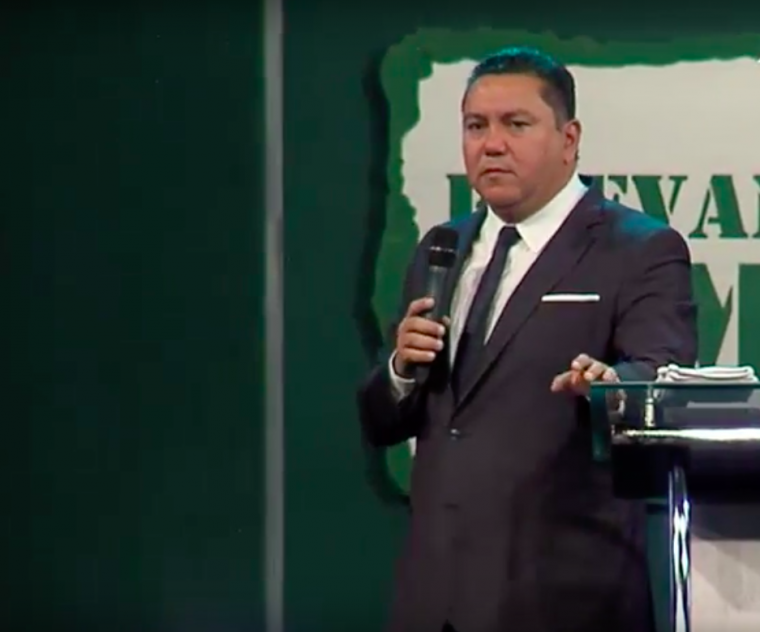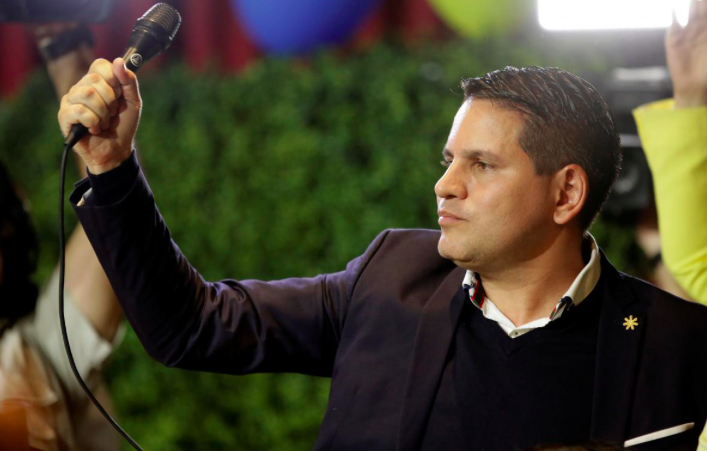Venezuelan pastor launches presidential bid as evangelical Christianity grips South American politics
A little-known Venezuelan evangelical pastor launched his bid to be the country's president on Sunday.
Javier Bertucci, of the religious organisation The Gospel Changes, said: 'I want to make this nation great, I want to bring Jesus to this nation, because Jesus dignifies the heart of any believer.'
Although his candidacy is an unlikely challenger to the unpopular President Nicolas Maduro, Bertucci is symbolic of religion's growing influence in South American politics.

In Costa Rica evangelical singer Fabricio Alvarado is enjoying unprecedented success and leads in the polls ahead of the April 1 vote. Likewise in El Salvador's upcoming elections there has been a rise of religious candidates, bringing a renewed focus to the role of evangelical leaders in Latin America.
While South America is home to more than 425 million Catholics – nearly 40 per cent of the world's Catholic population – nearly every country has experienced a net fall in the number of Catholics, according a 2014 poll by the Washington-based Pew Research Center.
Even at a time when the Roman Catholic Church now has a Latin American pope for the first time in its history, many Latin Americans are joining evangelical Protestant churches or rejecting organised religion altogether, the study showed. Across the continent 84 per cent were raised Catholic but only 69 per cent identify as Catholic as adults.
But the same pattern is reversed for Protestant churches as church leaders have stepped up their evangelisation efforts. Just one in 10 Latin Americans (nine per cent) were raised in Protestant churches but nearly one in five (19 per cent) now identify as Protestants, the research found.

Given this trend, the rise in prominence and popularity of a number of evangelical political candidates is not surprising. However it does raise questions about religion's influence in politics.
Statements by both the Episcopal Conference and the Federation Evangelical Alliance of Costa Rica asking Christians to 'meditate their vote before God and your conscience' were criticised as religious propaganda, according to Evangelical Focus. Costa Rica's Electoral Supreme Count issued a statement asking the organisations to 'abstain from issuing public manifestos' and stressing that 'priests and pastors are not allowed to use the pulpit, prayer places and liturgical ceremonies to induce the vote of their parishioners'.
In Venezuela Bertucci is not thought to pose a serious threat to Maduro, who is seeking re-election in an April vote that the international community has broadly described as stacked in Maduro's favour, and the country's opposition has not made a unified decision as to whether or not it will take part.
Bertucci has no known political experience and does not enjoy any significant name recognition in Venezuela. The Gospel Changes describes itself as a non-profit volunteer organisation dedicated to spreading Christian values.
But he said the country's economic crisis, which includes hyperinflation and chronic food and medicine shortages, can be solved 'very quickly' and that he is willing to ask other countries for help.
'Jesus changed history, and so will we,' he said in a speech announcing his candidacy. 'Today we start a race that we will win.'
The prominence of some evangelicals in Latin American politics is an indication of the growing strength of their Christian constituency. Whether they would be better at governing is still an open question – and whether their combination of idealism and conservative values can survive the messiness of politics is another.
By way of a warning they need look no further than their north American counterparts where evangelicals have lost both their moral high ground and distinctive values in a hunt for political power.











